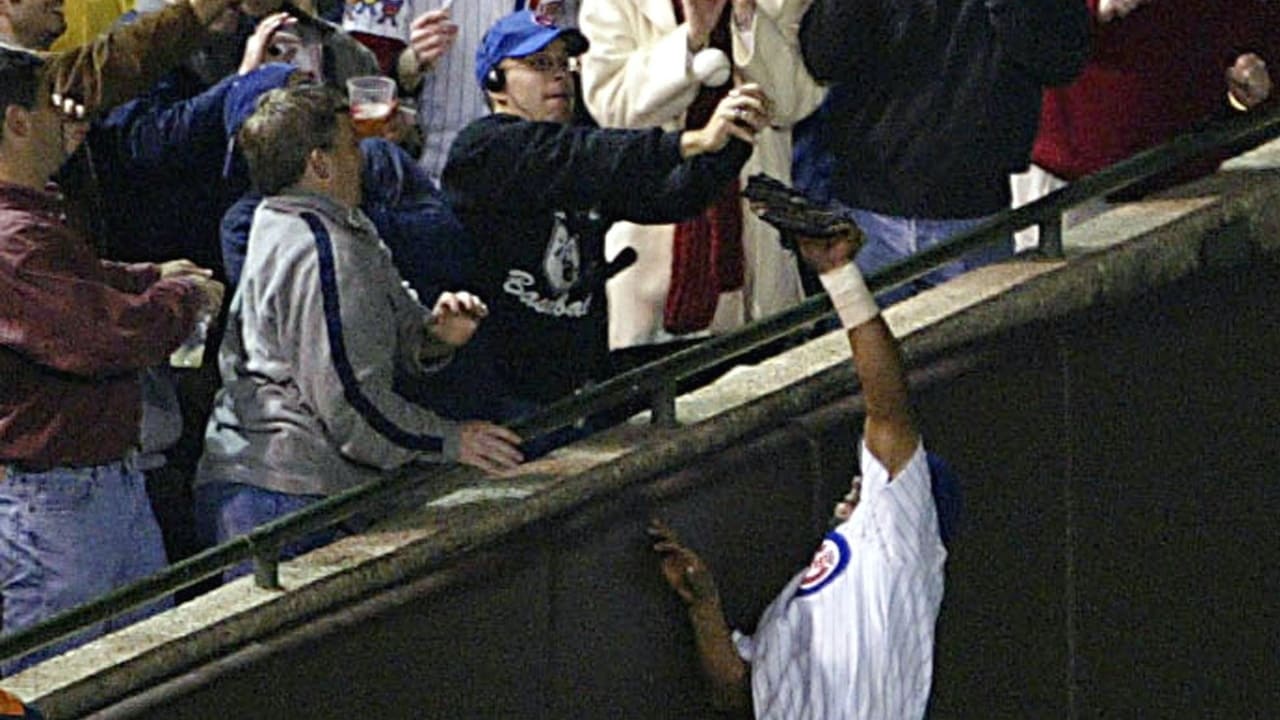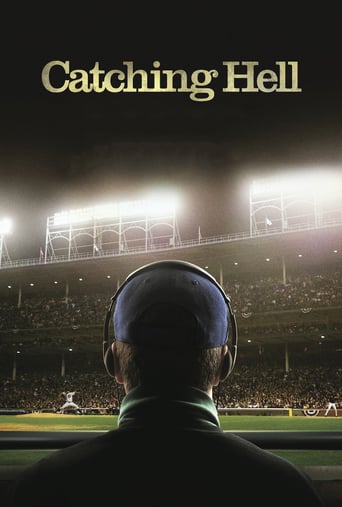

'Catching Hell' is a tough one for me to review. It is about a subject very near and dear to my heart. I have a passion for Cubs baseball that is insatiable. My heart was broken when the Cubs lost the NLCS in 2003. If a lynch mob were formed right then and there to get Bartman and crucify him, I'm not proud to admit it but I'd probably say go for it. It takes a little more than a masochistic edge to be a Cub fan. There's a lot of misery and heartache that has to be endured but there is a promise of a just reward. I am convinced that when the Cubs win the World Series it will be one of the most cathartic and joyous occasions in the history of sports. Make no mistake catharsis is a huge part of being a Cub fan. In 2003 we were robbed of our catharsis and we needed an external scapegoat. Unfortunately for Steve Bartman it became him. This isn't a documentary about baseball. It's a documentary about being human. There is a brilliant moment in the beginning of the documentary where Director Alex Gibney describes the aspects of being a fan better than I have ever heard before. Being a fan is putting yourself as the 26th man on your baseball team on an emotional and almost spiritual level. Baseball is an escape from the drudgery's of life and when your team wins you win with it. When you lose however you take the scars with the team. The weight though of the scars weighing down on Cubs and Red Sox fans is enormous. This is the culture the media fed Bartman to. I think the media above anyone else becomes the real villain in this fable. Was it right for Cubs fans to blame Bartman? I don't' know if we ever really did. He became a face to the pains and frustrations and inadequacies of what the Cubs culture meant. Do I understand the anger? Yes. I feel angry myself. I don't think the Bartman wound will ever heal as long as the Cubs continue their title drought. There's a moment at the end where Gibney simulates Alou making that fateful catch. It was like him reopening the 2003 wound in this Cubs fans chest. It isn't' rational but it exists.
... View MoreI have watched a few of the ESPN documentaries recently because a couple of good ones made me watch more and this one looked like it had potential. Sports is always filled with great stories and even though I am not a baseball fan I was aware of the two stories here. Funnily enough I was only aware of Buckner because of his recent role on Curb Your Enthusiasm, but I was aware of Steve Bartman by deed rather than name, since the one-line summary of what he did essentially went around the western world as one of those "and finally" stories they like to close the news out with before chuckling and saying good night. That the film was written and directed by Gibney just made me more keen to see it because he had done very good work with Smartest Guys in the Room and Taxi to the Dark Side, so he is a guy who can make documentaries.Sadly Catching Hell is not as good a documentary as it should have been because of how it sets out its stall but really fails to achieve its goal. The actual telling of the two sporting moments is well done; even those very familiar with both will find the retelling interesting because it is well structured and interesting. The focus on the Buckner incident is a good starting point and sets the theme of the scapegoat well before we go into the Bartman incident. The casual viewer will find much of interest here and indeed my girlfriend started watching this at one point without any knowledge of it and was quite held by the telling. However, where the film is weak is because it doesn't do anything beyond this telling, even though it is structured to do so and constantly sets itself up to do so.The film is set-up with Gibney asking questions about why we always seem to have these scapegoats and what causes one specific moment to be blamed more than any other – after all, none of the games we look at here (or the many others you'll think of) are lost in just that one moment, so why? He looks briefly at the history of superstition around each club and he then moves on to look at each incident in terms of how it was handled by the media, the other professionals and the fans. However in none of these do we seem to go beyond just looking and in that we never go beyond the surface really. The questions Gibney asked at the start as his frame seem to be mostly absent from the rest of the film and it is a lesser beast for it. The role of the media in overdoing the talking points would have been a focal point I'd like to have seen chased, since this is where both incidents appear to have gone from frustration into hatred and being a focus for anger. Sadly, although Gibney gets some comments out of those speaking for the media, he really doesn't push it.In the end what we are left with is a film that captures the two incidents and makes for an interesting sports film in that regard but really doesn't stand out as a good documentary simply because it doesn't question and probe in the way I felt it should have done. It captures events really well but it just doesn't explore them in a way that would have made for a better film.
... View MoreI was pretty familiar with both of these stories, but this two-hour special was still very good and a real eye-opener in parts, particularly on Steve Bartman.Basically, it's a story of injustice. It's about two men, one a ballplayer in Boston and another, a fan in Chicago, and how one incident unjustly ruined their lives. The ballplayer is Bill Buckner, who let a ground ball go through his legs which contributed - not cost - to his team losing the 1986 World Series to the New York Mets. Most people have seen lots of footage of the amazing comeback of the Mets in that series and know how the media (mainly) made Buckner the scapegoat.The bulk of this ESPN story, however, deals with Bartman, the unlucky fan who did what everyone else does at a game: reached with outstretched arms for a foul ball. In a nutshell, the Cubs - whose fans were desperate for the team's first championship since 1908 - lost the game and went on to miss the World Series. They blamed it on this fan because the Cubs left fielder, Moises Alou, made a big stink about it on the field and it would have given the Cubs two outs in the eighth inning while they were holding a 3-0 lead. If they won, they would have advanced to the world series. The opponents, the Florida Marlins, went on to score eight runs in the inning, won the next game, as they won the World Series. Who did the Cubs fans blame? The shortstop who booted an easy double-play ball in the inning? The pitchers who gave up all the runs? Nooooo. They blamed Bartman, a nerdy-looking young man who just there rooting for his beloved Cubs like everyone else.The shocking part of the story is the behind-the-scenes footage at the game, the stuff you didn't see in this 2003 playoff game. The abuse this young guy took was unbelievable. You have to see it and hear it to believe it. It's shocking and it's disgraceful. It's a wonder he made it out alive from Wrigley Field and still lives - although in a pretty secret world - in the Chicago area.This is one of those stories that a review here doesn't do the story justice. You have to sit and watch "Catching Hell" to get the full impact. It left me speechless.
... View MoreIm not sure how ESPN goes about choosing those who direct the documentaries in the 30 for 30 series, but they always seem to find the best.The documentary is as much about Bartman as it is the overall reaction of long suffering Cubs fans. Add in the description of how the Cubs securities forces got Steve Bartman out of there alive, and you have a fast moving, very entertaining and informative docudrama.And there is plenty of new light shed on the infamous incident. Testimonies from fans that sat near Bartman (many of whom sympathize with the hapless Cubs fan) and learning that Bartman was actually at the game with friends was interesting. However, this pails in comparison when there is focus on the little league team (whose sweater Bartman was wearing that night) that Bartman was coaching at the time, and those young ball players support of their coach.If anyone comes out the villain, it's the arrogant Cubs fan who left his seats in the nose bleed section to yell at Bartman, a man who to this day admits that he'd do it again, and blames Bartman for the Cubs lose.Moises Alou doesn't come off too good at all. Alou comes off arrogant, and dismissive of the suffering that Bartman went through. Even with Alou's thick accent, you can tell that he still deep down blames Steve Bartman for the Cubs never making it to the world series.This film not only manages to shed tons of new details on the incident, but also manages to have the viewer walk away wanting to buy Steve Bartman a beer and pat him on the back, instead of crucifying him.And maybe that's what the Cubs (and their fans) need to do. It's time for the Cubs to forgive Steve Bartman the way the Red Sox forgave Bill Buckner.PS It was interesting to know that Buckner was wearing a Cubs batting glove on his hand when he missed the bunt from Mookie Wilson.
... View More